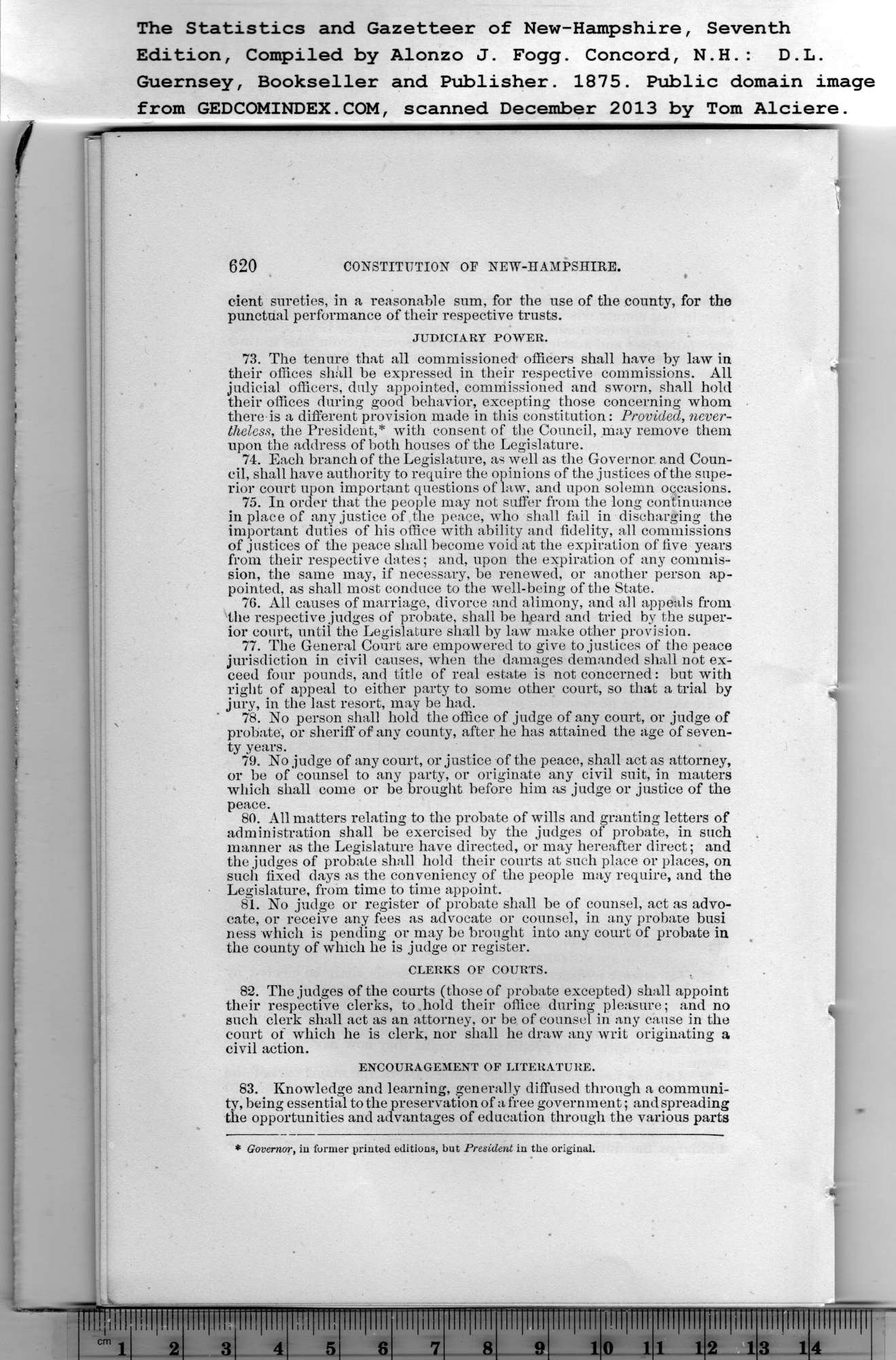|
620 CONSTITUTION OF NEW-HAMPSHIRE.
cient sureties, in a reasonable sum, for the use of the county, for the
punctual performance of their respective trusts.
JUDICIARY POWER.
73. The tenure that all commissioned officers shall have by law in
their offices shall he expressed in their respective commissions. All
judicial officers, duly appointed, commissioned and sworn, shall hold
their offices during good behavior, excepting those concerning whom
there is a different provision made in this constitution: Provided, never-
theless, the President,1 with consent of the Council, may remove them
upon the address of both houses of the Legislature.
74. Each branch of the Legislature, as well as the Governor and Coun-
cil, shall have authority to require the opinions of the justices of the supe-
rior court upon important questions of law, and upon solemn occasions.
75. In order that the people may not suffer from the long continuance
in place of any justice of tlie peace, who shall fail in discharging the
important duties of his office with ability and fidelity, all commissions
of justices of the peace shall become void at the expiration of five years
from their respective dates; and, upon the expiration of any commis-
sion, the same may, if necessary, be renewed, or another person ap-
pointed, as shall most conduce to the well-being of the State.
76. All causes of marriage, divorce and alimony, and all appeals from
the respective judges of probate, shall be heard and tried by the super-
ior court, until the Legislature shall by law make other provision.
77. The General Court are empowered to give to justices of the peace
jurisdiction in civil causes, when the damages demanded shall not ex-
ceed four pounds, and title of real estate is not concerned: but with
right of appeal to either party to some other court, so that a trial by
jury, in the last resort, may be had.
78. No person shall hold the office of judge of any court, or judge of
probate, or sheriff of any county, after he has attained the age of seven-
ty years.
79. No judge of any court, or justice of the peace, shall act as attorney,
or be of counsel to any party, or originate any civil suit, in matters
which shall come or be brought before him as judge or justice of the
peace.
80. All matters relating to the probate of wills and granting letters of
administration shall be exercised by the judges of probate, in such
manner as the Legislature have directed, or may hereafter direct; and
the judges of probate shall hold their courts at such place or places, on
such fixed days as the conveniency of the people may require, and the
Legislature, from time to time appoint.
81. No judge or register of probate shall he of counsel, act as advo-
cate, or receive any fees as advocate or counsel, in any probate busi
ness which is pending or may be brought into any court of probate in
the county of which he is judge or register.
CLERKS OF COURTS.
82. The judges of the courts (those of probate excepted) shall appoint
their respective clerks, to.hold their office during pleasure; and no
such clerk shall act as an attorney, or be of counsel in any cause in the
court of which he is clerk, nor shall he draw any writ originating a
civil action.
ENCOURAGEMENT OF LITERATURE.
83. Knowledge and learning, generally diffused through a communi-
ty, being essential to the preservation of a free government; and spreading
the opportunities and advantages of education through the various parts
1
Governor, iu former printed editions, but President in the original.
PREVIOUS PAGE ... NEXT PAGE
This page was written in HTML using a program written in Python 3.2
| 